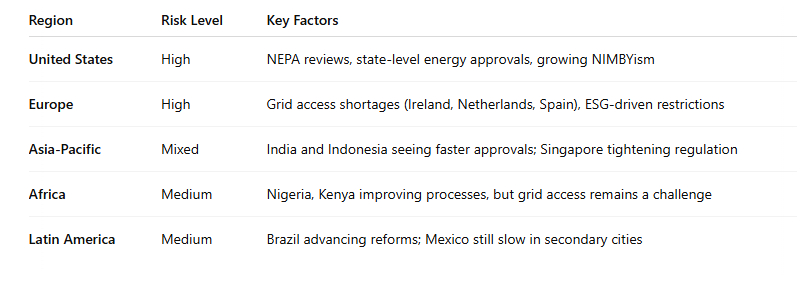Permitting and Regulatory Delays: The Hidden Threat to Data Center Investors
The next AI gold rush isn’t just about chips and compute. It’s about how fast you can break ground and how long you’re stuck waiting for permits.
You received this email because you subscribed to Global Data Center Hub, a newsletter about the global data center sector.
Thank you very much for supporting my newsletter this month. Your readership encourages me to provide these insights, and I’m truly grateful for it.
We publish new insights seven days a week, helping you stay ahead of the most important shifts in data centers, AI infrastructure, and global connectivity.
Our premium insights are reserved for paid subscribers.
If you haven’t upgraded yet, now’s a great time:
👉 Subscribe and join 1000+ readers of Global Data Center Hub with a 20% discount on the annual plan: Subscribe here
While investors scramble to pour billions into data centers to meet AI-driven demand, a quiet enemy is eroding returns: permitting and regulatory delays.
It’s a threat that doesn’t make headlines. But in boardrooms and investment committees around the world, it’s redefining the winners and losers of the digital infrastructure race.
If you're still underwriting projects assuming "normal" timelines, you're already behind.
The Silent Killer of Returns
Permitting delays used to be a nuisance.
Today, they’re a strategic risk.
Global research shows that data center projects are being delayed by 18–36 months in key markets due to:
Bureaucratic complexity: Layers of approvals, licensing, and political hurdles that vary wildly between jurisdictionsGlobal Data Center Hub ….
Lengthy environmental reviews: U.S. NEPA requirements alone can stretch approvals beyond 2–3 yearsSubstack Newsletter Ins….
Zoning and land use restrictions: Many sites aren't zoned for hyperscale loads, and securing variances is slowGlobal Data Center Hub ….
Power grid access bottlenecks: Securing grid connections can take 5–15 years in congested areasGlobal Data Center Hub …Substack Newsletter Ins….
And these aren't just paper delays. They translate directly into:
Higher holding and financing costs
Lost early-mover advantage
Missed AI workload migrations
Project IRRs falling below investment thresholds
The cost of "waiting" is no longer theoretical. It’s showing up in blown budgets and missed cycles.
How Smart Capital is Adapting
The best investors are no longer treating permitting as a passive process.
They’re embedding three defensive strategies into every deal:
1. Early Engagement and Pre-Application Work
Winning starts before land acquisition.
Proactive mapping of zoning overlays, environmental red flags, and grid connection feasibility
Building coalitions with local officials and community stakeholders early
Pre-negotiating environmental mitigations or land use amendments before submitting formal applications
In places like Georgia, Texas, and Chennai, pre-application work has shaved 6–12 months off typical timelines.
2. Specialist Advisory Teams
The winners are hiring:
Local permitting experts
Environmental legal counsel
Grid connection consultants
Instead of treating these as "line items," they’re embedding them into core investment underwriting.
As a Morgan Lewis report notes, data centers that engage permitting expertise early are 4x more likely to meet project delivery timelines.
3. Policy Advocacy and Regulatory Risk Pricing
Instead of waiting for governments to fix the problem, smart operators are:
Joining regional policy coalitions
Lobbying for fast-track data center corridors
Pricing permitting risks explicitly into deal structures (via milestones, break fees, or extended timelines)
Recent U.S. executive orders have opened pathways for "priority AI infrastructure" permitting, but political swings could unwind them.
Savvy players hedge regulatory risk upfront, not after a change in administration.
The Geography of Delay
Not all markets are equal.
The regional risk map starts here. Upgrade to unlock.
Bottom Line:
Hyperscale hubs (Ashburn, Frankfurt, Singapore) are often gridlocked.
Secondary markets (Texas, Sao Paolo, Chennai) are now prime because of permitting velocity as much as land and power.
Why This Matters Now More Than Ever
AI’s infrastructure demands aren’t linear.
They’re exponential.
McKinsey projects global data center demand could 3x by 2030.
If permitting timelines don’t accelerate, the sector could see a critical mismatch:
Demand surging
Build capacity constrained
Investable returns compressed
In a world where compute is becoming a sovereign asset, permitting isn’t just bureaucracy.
It’s national competitiveness.
Final Take: Permits Are the New Moats
If you want to outperform in data center investing over the next decade, it won’t be enough to pick good markets.
You’ll need to:
De-risk permitting at the source
Price regulatory lag into every project
Prioritize execution speed as a core competitive advantage
Because in the AI era, the infrastructure that gets built first wins.
And the investors who master permitting risk?
They won’t just survive.
They’ll own the digital future.


